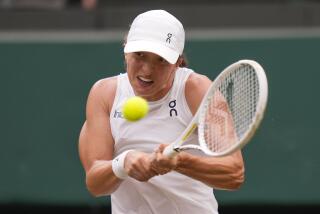Soviet Attitude Changing Toward Tennis
- Share via
WIMBLEDON, England — It was the kind of sport--the czars came out at night. A big, big sport.
A popular player of the day went to St. Petersburg, Russia, in 1914 for a little invitational and was surprised to see that the czar’s footmen served as ballboys. That was a nice touch. They carried the tennis balls to players on silver salvers. It hasn’t been that kind of sport for a long while, though, not in Russia. While the Wimbledon championships here at the All England Lawn Tennis Club have become one of the toughest tickets in the world, the tennis revolution was one the Soviets chose not to endorse. Nobody has chalked off Red Square and strung a net, is one way to put it.
The man from Tass explains: “For us, there is Olympic sport and there is non-Olympic sport.”
He laughs at the distinction; it’s hilarious, really. A child involved in a non-Olympic sport might as well take up cabinet-making as far as the republic is concerned.
In fact, tennis is back in the Olympics this year, but only after a long absence. In the meantime, the republic discovered something interesting. Tennis produced no medals and thus no political glory, but it does make available huge sums of money. Mountains of dollars.
Money is something everybody needs, regardless of political preference. The silver salvers have long since been melted down and what’s wrong with a little income, anyway?
So we have Natalia Zvereva, communism’s capitalist tool. She is the eighth-seeded player in the women’s draw here. She accounted for a theoretical $81,426 in winnings last year, and now, finally declared professional, has become a nice source of Soviet revenue, non-theoretical.
Figure a quarter-million dollars this year, although an impressive performance in this year’s Wimbledon could hike that number. You hate to low-ball somebody who has already whipped Martina Navratilova this year.
Tennis is getting somewhat bigger in the Soviet Union.
Says the man from Tass: “The first day of Reagan’s visit, we had on TV Reagan, Gorbachev and then Zvereva at the French Open.” He pauses for effect. “Delayed tape.”
The Soviets have had tennis before, of course. Olga Morozova, about as Russian as a tearoom, came here in 1974 and played Chris Evert in the final. Ted Tinling designed a silver lame pleated dress for her, a dress that briefly hung in the Victoria and Albert Museums.
Today, three Soviet women will play at Wimbledon, and Andrei Chesnokov, seeded 14th in this tournament, has had impressive victories in the French Open, although he was upset here in the first round.
But mostly, the sport has been regarded as a form of play.
“I would like to remind, we have very cold winters,” the man from Tass says.
No grass courts?
“Perhaps AstroTurf,” he suggests. But now that tennis is a fiscal resource, he says, “There may be indoor grass courts.”
Is he kidding?
“Well, in April, we opened our first country club.”
Zvereva is no joke, however. At least the other players aren’t laughing. When she beat Navratilova in the French Open, Navratilova said, “I can’t believe I lost to that girl.”
Believe it.
But at 17, Zvereva is still capable of disaster, as when she lost to Steffi Graf, 6-0, 6-0, in the same tournament.
Still, she won more than $120,000 in that tournament and, with size and a style similar to Navratilova’s, she rates something of a future.
Zvereva, with her long, painted fingernails and copy of “Hollywood Wives,” appears the typical teen-ager, although her English may be better than the typical American teen-ager’s. Zvereva is not a typical Minsk teen, though. She only took to tennis because her father, Marat, is a coach.
“He was not so good a player,” the man from Tass says. “But even Tolstoy’s father could write a little.”
She grew up watching “Chrissie and Borg.”
Everyone else she knew was watching gymnasts. But who thought you could make money at this? So far she is not making much and won’t talk about how much it actually is. It has been reported that she gets $20 a day walking-around money.
The Soviets are not just alert to the possibilities of prize money. Several years ago, the government licensing arm made a deal with ProServ’s Paris office to bring in yet more income. It is not because of fashion preference entirely that Zvereva wears a white sweater with a Nike patch on the shoulder.
Zvereva, who won a mini junior grand slam last year--all but the Australian junior championship--calls her last appearance here her “poor man’s Centre Court.”
She was referring to the status of the event mostly, but partly its financial gains. It says in her media biography that her favorite car is Mercedes-Benz. Like the rest of the Soviet Union, which will be watching the Wimbledon tournament live for the first time, she has her eyes on a better paying Centre Court.
More to Read
Go beyond the scoreboard
Get the latest on L.A.'s teams in the daily Sports Report newsletter.
You may occasionally receive promotional content from the Los Angeles Times.






